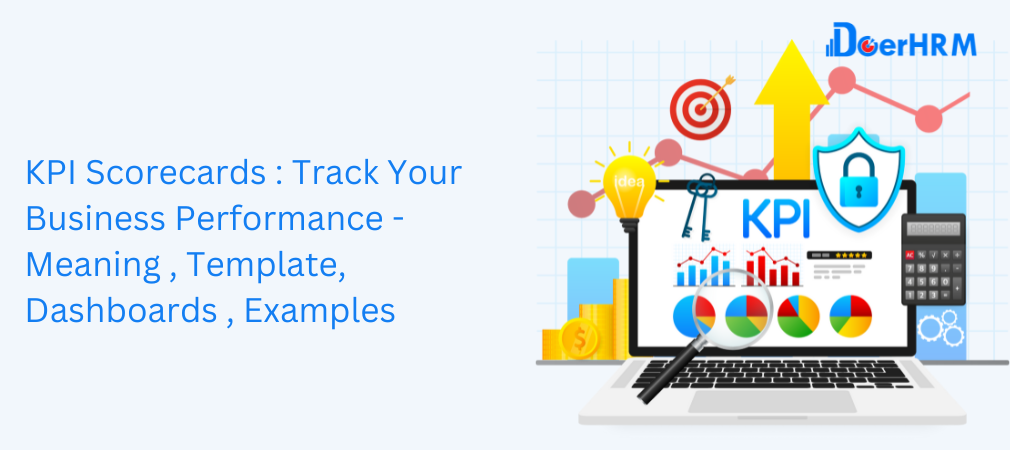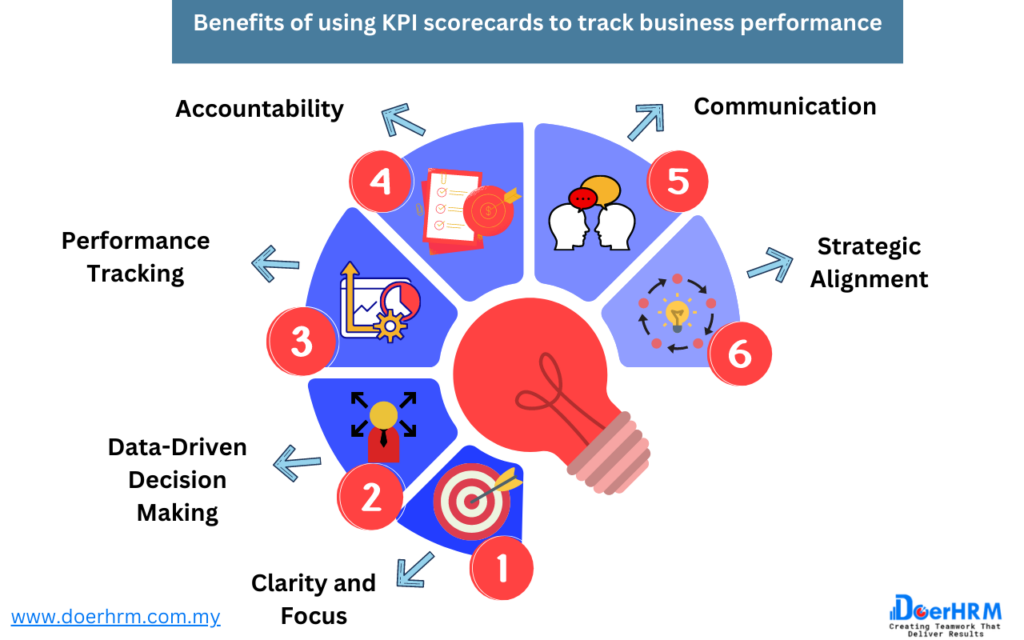KPI Scorecards : Track Your Business Performance – Meaning , Template , Dashboards , Examples

Experience the power of seamless HR management with our free trial - sign up now at https://app.doerhrm.com/app/freeregister !
Download our comprehensive guide to KPI and OKR implementation at https://www.doerhrm.com.my/download-online-kpi-okr-guide/ today.
Tracking business performance is essential for the success of any organization. It allows businesses to measure their progress, identify areas of improvement, and make informed decisions to achieve their objectives. Key Performance Indicators (KPIs) are a set of metrics that organizations use to track and evaluate their performance. KPI scorecards are tools that businesses use to monitor their progress towards achieving their goals.
This article will discuss the importance of tracking business performance and the role of KPI scorecards in achieving this objective. It will also provide an overview of the article’s structure, which includes a detailed explanation of KPIs and scorecards, the benefits of using KPI scorecards, and the steps involved in creating a KPI scorecard. Additionally, the article will offer some tips for effectively using KPI scorecards and some common mistakes to avoid when implementing KPI scorecards. Finally, it will conclude with a summary of the main points covered in the article.
What are KPI Scorecards?
Definition and explanation of KPI scorecards
KPI scorecards are tools used by organizations to monitor their performance against key business objectives. They are visual representations of key performance indicators (KPIs) that provide a clear, concise, and easy-to-understand view of an organization’s performance. KPI scorecards help businesses to identify areas of strength and weakness and to make data-driven decisions to improve their overall performance.
A KPI scorecard typically includes a set of KPIs that are relevant to the organization’s goals and objectives. KPIs are metrics that measure how well an organization is performing against its objectives. They are often used to assess performance over time and to compare performance with other organizations in the same industry.
KPI scorecards may be designed for different levels of the organization, from the overall company to individual departments or teams. They may also be used to track performance over different time periods, such as weekly, monthly, or quarterly.
KPI scorecards are typically presented in a graphical format, such as a dashboard, to make it easier for users to quickly and easily understand the organization’s performance. They may include charts, graphs, tables, and other visual aids to help users identify trends and patterns in the data.
Overall, KPI scorecards are valuable tools for monitoring and improving organizational performance. By tracking key performance indicators and presenting them in an easily accessible format, organizations can make informed decisions to improve their operations and achieve their strategic objectives.
Benefits of using KPI scorecards to track business performance

Using KPI scorecards to track business performance offers numerous benefits, including:
Clarity and Focus: KPI scorecards provide a clear and focused view of an organization’s performance. By tracking key metrics, businesses can identify areas of strength and weakness and focus on improving performance in areas that are critical to achieving their objectives.
Data-Driven Decision Making: KPI scorecards provide businesses with data to make informed decisions. By tracking performance metrics, businesses can make decisions based on objective data rather than intuition or guesswork.
Performance Tracking: KPI scorecards allow businesses to track performance over time. By monitoring KPIs regularly, businesses can identify trends and patterns and make adjustments to their operations to improve performance.
Accountability: KPI scorecards help to promote accountability within an organization. By tracking performance metrics, businesses can hold individuals and teams accountable for meeting their objectives and contributing to the overall success of the organization.
Communication: KPI scorecards facilitate communication within an organization. By presenting data in a clear and concise manner, businesses can easily share performance information with stakeholders and make sure everyone is on the same page.
Strategic Alignment: KPI scorecards ensure that business activities are aligned with strategic objectives. By tracking metrics that are directly tied to strategic goals, businesses can ensure that their operations are moving in the right direction and making progress towards their long-term objectives.
Overall, using KPI scorecards to track business performance offers numerous benefits that can help businesses improve their operations, make data-driven decisions, and achieve their strategic objectives.
Read More at : https://www.doerhrm.com.my/kpi-scorecards/
